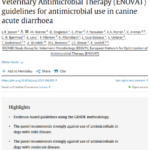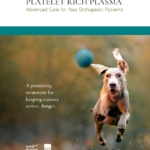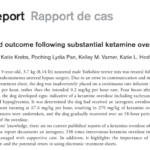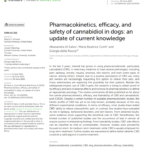scott@vtx-cpd.com
Forum Replies Created
-
AuthorPosts
-
Hi Raquel,
Thanks for sharing this! Yes, I’m familiar with the WASAVA guidelines and the ENOVAT recommendations for antimicrobial use in canine acute diarrhea. I think they provide a strong evidence-based approach to antimicrobial stewardship, particularly in reinforcing that antibiotics should be avoided in mild to moderate cases unless there are indicators of significant systemic inflammation.
One area where I diverge slightly is their stance on probiotics. While the guidelines remain neutral due to the evidence balance, I still strongly recommend their use in practice. Even if the magnitude of benefit isn’t always substantial, probiotics are generally safe and contribute to gut microbiome support, so I continue to advocate for their inclusion in treatment plans.
Additionally, I think it’s important to consider other adjunctive therapies, such as fecal microbiota transplantation (FMT) and clay-based products, both of which can be highly beneficial in acute diarrhea management. There’s growing literature supporting their roles, and I’ve included a couple of references below:
ENOVAT Guidelines on Antimicrobial Use in Canine Acute Diarrhea: https://www.sciencedirect.com/science/article/pii/S1090023324001473?via%3Dihub
Probiotics and Gut Microbiome in Acute Diarrhea: https://pubmed.ncbi.nlm.nih.gov/32562450/
Clay-Based Therapy for Gastrointestinal Disorders: https://pubmed.ncbi.nlm.nih.gov/39094622/
Would love to hear your thoughts on this as well!Best,
Scott
Replying to Rachel L. 01/03/2025 - 16:12
Thanks Rachel,
I hope you have enjoyed the ophthalmology course too. Your approach to nutritional management in diabetic pets is really interesting, and I completely agree that diet plays a major role in both stabilizing and achieving remission, particularly in cats.
Your experiences with Katkin and prescription diabetic diets align with a lot of the research on macronutrient management in diabetic patients. While high-protein, low-carb diets have been shown to increase remission rates in cats, the broader literature also emphasizes that each diabetic patient should be managed individually, taking into account body condition, comorbidities, and feeding preferences. The work by Parker and Hill (2023) highlights this well, noting that while diet modification can help glycaemic control, many animals don’t necessarily require a diet change, especially if they’re already on a complete and balanced diet with controlled feeding schedules. However, in cases like your Sheba-fed cat, where remission was achieved but later lost, it raises the question of how much dietary composition shifts over time and whether that might impact long-term glucose control.
I also appreciate your approach to diabetic dogs. While the literature suggests that prescription diabetic diets don’t always provide a clear advantage over a balanced adult maintenance diet, your success in stabilizing patients quickly supports the idea that a higher-fibre approach can improve glycaemic control. The study emphasizes that fibre can help regulate postprandial glucose spikes, though it also notes that calorie intake and body condition score are just as critical. Your shift towards immediate prescription diet use rather than modifying the existing diet over time makes a lot of sense, especially from a cost-effectiveness and clinical stability perspective.
Another key takeaway from the research is that meal timing relative to insulin administration is less rigid than traditionally thought. While twice-daily meal feeding is often recommended with intermediate-acting insulins, newer approaches with basal insulins may not require such strict meal-insulin pairing. Given that some of your cats have responded to diet alone, it also reinforces that metabolic control isn’t solely about insulin, it’s about the broader picture of energy intake, weight management, and overall consistency.
It sounds like your recent cases have gone exceptionally well, whether that’s luck or refined management strategies, it’s fantastic to see such positive outcomes. Thanks for sharing your insights, really enjoyed hearing about your experiences! Would love to hear if you’ve noticed any trends in long-term dietary adherence among owners, do they stick with the recommendations or do they revert to old habits over time?
Thanks again!
Scott 🙂
Hello!
What a great question! This is not something I have direct experience with, but I spoke to some collegues and pulled together some information I hope is useful:
Platelet-rich plasma (PRP) is an emerging regenerative therapy in veterinary medicine, particularly in orthopedic conditions such as osteoarthritis and tendon injuries. It has been widely used in human medicine, but its efficacy in dogs remains an area of ongoing research and debate.
What is PRP?
PRP is a concentrated portion of blood rich in platelets, which contain growth factors that promote tissue healing and reduce inflammation. It can be injected into joints, soft tissues, or used as a platelet-rich fibrin clot (PRFC) to enhance tissue regeneration.
Mechanism of Action
Platelets contain transforming growth factor beta (TGF-β1) and platelet-derived growth factor (PDGF), which modulate inflammation by reducing pro-inflammatory cytokines (IL-1, TNF-α) and inhibiting destructive enzymes such as matrix metalloproteinases (MMPs). The goal is to enhance the body’s natural healing response at the site of injury.
PRP Preparation
PRP is typically prepared by centrifugation of whole blood, separating platelets from red blood cells and white blood cells. The final composition varies between commercial systems, individual patients, and species, affecting treatment outcomes.
Higher platelet concentrations provide more growth factors but may not always be beneficial.
White blood cell content influences inflammatory response, with leukocyte-poor PRP potentially being more effective for chronic conditions.Current Evidence in Veterinary Medicine
1. PRP in Canine Osteoarthritis (OA)
Bergström et al. (2024, Vet Sci) investigated PRP with stromal vascular fraction (SVF) in dogs with elbow OA. Improvement in gait symmetry was observed, but overall efficacy was inconclusive.
Full paper: https://www.mdpi.com/2306-7381/11/7/296
Bland (2015) suggested PRP as a promising treatment for hip osteoarthritis, with some dogs showing reduced pain and improved mobility.2. PRP in Cruciate Ligament Disease & Post-Surgical Recovery
Volz et al. (2024, J Small Anim Pract) conducted a randomized controlled trial comparing PRP, hyaluronic acid, and no injection post-TPLO for cranial cruciate ligament rupture.
No significant improvement in recovery, osteoarthritis progression, or limb function was observed.
Full paper: https://onlinelibrary.wiley.com/doi/10.1111/jsap.137043. PRP vs. NSAIDs in Joint Disease
Raulinaitė et al. (2023, Vet Sci) compared PRP to NSAIDs in dogs with CCLR and patellar luxation.
PRP reduced inflammation and improved muscle strength more effectively than NSAIDs.
Full paper: https://www.mdpi.com/2306-7381/10/9/5554. PRP & Photobiomodulation Therapy (PBMT) in Osteoarthritis
Alves et al. (2023, Animals Basel) found that PRP combined with PBMT (laser therapy) led to greater and longer-lasting pain relief and improved mobility compared to PRP alone.
Full paper: https://www.mdpi.com/2076-2615/13/20/3247
Comparison with Human MedicineThe debate over PRP’s efficacy is not unique to veterinary medicine.
Campbell et al. (2015, Arthroscopy) reviewed PRP for knee osteoarthritis in humans and found symptomatic relief for up to 12 months, especially in early-stage OA. However, variability in PRP preparations made conclusions difficult.
Full paper: https://www.arthroscopyjournal.org/article/S0749-8063(15)00395-8/fulltext
Clinical ConsiderationsPRP appears safe but its effectiveness varies depending on platelet concentration, white blood cell content, and patient factors.
No clear superiority over traditional treatments such as NSAIDs, hyaluronic acid, or corticosteroids has been consistently demonstrated.
PRP may have a role in multimodal therapy, especially when combined with laser therapy or other regenerative treatments.
Conclusion
The jury is still out on PRP’s efficacy in veterinary medicine. While some studies show promising results, others indicate no clear benefit over conventional therapies. Given the variability in PRP preparations and patient response, more high-quality, controlled trials are needed.
I hope thus helps! I would love to hear how you get on with this! I would also love to hear if any others have more direct experience!
This also seems like a useful resource: https://www.aaha.org/wp-content/uploads/globalassets/05-pet-health-resources/pain-management/aaha-arthrex-poster-front-small-booklet-trends-nov-2022-web.pdf
Scott 🙂
Replying to Raquel M. 24/02/2025 - 16:21
No problem!
Let me know how you get on with the product!
Have a lovely weekend.
Scott 🙂
Hello everyone,
I went down a bit of a ketamine rabbit hole after you started this discussion—I didn’t realize people were using ketamine in such a sporadic subcutaneous way, and I think that’s really interesting.
I also came across this case report that I thought was worth sharing. A dog accidentally received an extreme ketamine overdose—338 times the intended dose—due to a misinterpretation of an electronic treatment sheet. The dog was on a 67.6 mg/kg/hr CRI for four hours, receiving 270 mg/kg total, and developed tachycardia, hyperthermia, anisocoria, and hypoglycemia. Fortunately, with aggressive supportive care, he made a full recovery within 18 hours without lasting effects.
The case is published in Can Vet J. 2023 Mar;64(3):235–238 (PMC9979721, PMID: 36874544) and highlights both the potential resilience of patients in extreme circumstances and the importance of clear doctor-technician communication when using electronic treatment sheets.
Scott
Thanks again for the great question.
Are you using paracetamol a lot in your practice?
Scott 🙂
Replying to Raquel M. 25/02/2025 - 16:03
Hi Raquel,
Glad you found the information helpful!
Regarding the potential link between chronic paracetamol use and splenic tumours in dogs, I am not aware of any strong evidence supporting this association. While chronic paracetamol use in humans has been scrutinized for various long-term effects, including potential renal, cardiovascular, and hepatic impacts, there is no well-documented link to tumorigenesis in the spleen. In veterinary medicine, there is similarly no widely recognized data suggesting an increased risk of splenic neoplasia with chronic use.
If your colleague has seen a study or case series suggesting this link, I would be really interested to read more about it. Until there is more substantial evidence, I would consider this more of a theoretical concern rather than a proven risk?
Let me know if you come across anything on this; I’d be happy to discuss further.
Best,
Scott 🙂
Another brilliant video!
Scott 🙂
Replying to Josep B. 24/02/2025 - 10:11
Thank you!
Scott 🙂
Replying to Raquel M. 24/02/2025 - 16:45
Hi Raquel,
Thanks for your message, and I’m really glad the discussion has been helpful.
The 10–15 mg/kg dose every 8–12 hours, as recommended in Plumb’s, is generally considered safe and should provide effective analgesia in many cases. In otherwise healthy dogs, this dose is a reasonable starting point, particularly when used as part of a multimodal pain management approach. The Pardale-V dose used in the UK (33 mg/kg BID-TID) is higher but is based on a fixed paracetamol/codeine combination, which may alter its pharmacokinetics and clinical effect.
Efficacy at the lower dose depends on the type and severity of pain being treated. Paracetamol is a mild analgesic and antipyretic, and while it can be beneficial in musculoskeletal pain and chronic osteoarthritis, it may not be as effective for moderate to severe pain compared to NSAIDs, opioids, or adjunctive analgesics like gabapentin or amantadine. Some clinicians opt for the higher Pardale-V dose due to perceived improved efficacy, but there is a balance between achieving analgesia and minimizing potential hepatic or gastrointestinal side effects, particularly with long-term use.
If starting at 10–15 mg/kg and pain control seems inadequate, titrating within the safe range or adding adjunctive analgesia may be a better approach than immediately jumping to the higher dose. As always, patient monitoring, especially for any signs of toxicity, is key when using paracetamol in clinical practice.
Let me know if you’d like to discuss further.
Best,
Scott
Replying to Raquel M. 24/02/2025 - 16:55
Thanks for sharing your insights, Rachel! I completely agree, it’s so valuable to have evidence-based guidelines to refer to for these common but often frustrating cases.
Your approach to prazosin use aligns with a lot of the recent discussions I’ve seen. It’s interesting that you haven’t encountered rebound spasm, which makes me wonder if the weaning recommendation is more relevant for those using it frequently or at higher doses. I also appreciate your nuanced approach, reserving it for recurrent cases or those where preventing another obstruction is critical from a welfare or owner-retention perspective makes a lot of sense.
I really like that you incorporate the Ohio State Indoor Cat Initiative principles. It’s such a great resource for guiding owners through environmental modifications, which, as you pointed out, can be the hardest part when compliance is a challenge. Have you found any particular strategies from it that owners tend to be more receptive to?
Hydration strategies like Hydracare and pain management with gabapentin, buprenorphine, and maropitant are great adjuncts as well. I’ve seen Hydracare work well in some cases to lower USG, but uptake can be hit or miss depending on the cat. Do you find good owner compliance with it?
Along with the above guidelines, iCatCare has also released recommendations specifically for caregivers and owners, which might be a useful resource for client discussions: https://icatcare.org/resources/cat-carer-guide-urinary-tract-diseases.pdf
Really appreciate the discussion, these cases are always a puzzle!
Scott 😊
Replying to Josep B. 24/02/2025 - 10:08
It is a really interesting topic!
I am considering it more and more, I have been sing it with some chronic regurgitation/GI cases too.
Scott 🙂
Replying to Josep B. 24/02/2025 - 10:05
Thanks for sharing this, Josep—great summary of CK and its clinical relevance!
I’ve always been a bit unsure about how to use CK effectively, so it was really interesting to explore this further in your recent journal club. The Jones & Harcourt-Brown study was particularly insightful, showing how CK (alongside AST) can serve as a rapid screening tool for Neospora-associated meningoencephalitis. The high sensitivity and specificity at the 485 U/L cutoff make it a useful early marker, though I still wonder about its reliability in milder cases.
In practice, I find CK elevations are often non-specific, especially in medicine cases!
Thanks again.
Scott 🙂
Replying to Josep B. 24/02/2025 - 09:58
Really interesting.
Thank you for sharing.
Scott 🙂
Replying to Rosanna Vaughan 11/02/2025 - 12:36
Hello again.
I had a reply from my contact at Zoetis:
“The SPC’s for GB are on the VMD product database https://www.vmd.defra.gov.uk/ProductInformationDatabase/. Here you will find the most up to date SPC’s for any products registered in GB.”
I hope that helps!
Scott 🙂
-
AuthorPosts





